
Dentures – Glastonbury, CT
Beautiful, Functional & Complete Tooth Replacement
If you’re missing teeth, you may be familiar with the ways that this dental issue can affect everyday activities like talking, smiling, and eating. Unfortunately, missing teeth can lead to even larger problems, affecting your oral and overall health. If you’re ready to give yourself a complete smile, we have the answer! Dr. Yu and Dr. John Carroll offer custom-made partial, full, and implant dentures to give you the replacement that works best for your smile. Keep reading to learn more about this tooth-replacement solution, including which option is best for you.

Why Choose Heim & Carroll DMD, LLC for Dentures?
- Full and Partial Dentures Available
- Advanced Implant-Retained Dentures
- In-Network with Most Dental Insurance Plans
Who’s a Good Candidate for Dentures?

Are you interested in getting your full smile back following tooth loss? If so, there’s good news: you’re likely a candidate for dentures! This tried-and-true tooth-replacement solution is ideal for a wide range of patients, including those who don’t have any of their natural teeth left. Plus, even if something initially stands in your way, like gum disease, we can add the necessary restorative care to your treatment plan, so a healthy, complete, and gorgeous smile isn’t out of reach.
Effects of Missing Teeth
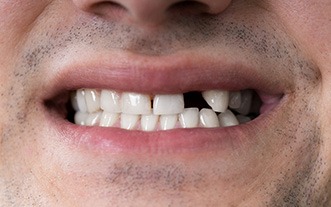
No matter why you are without multiple teeth or an entire arch, the effects on your oral and overall health can be problematic. For example:
- Your ability to eat certain foods – those good for your overall health – may become more difficult, causing you to rely on softer, less nutritious foods that negatively affect your overall well-being.
- Your inability to speak clearly can become evident as you may begin to slur your words. This can cause embarrassment when talking to others or attempting to meet someone new.
- Your lack of confidence can hinder opportunities for professional advancement or personal connection.
- Your oral health can begin to decline, as gaps in your smile can result in bone resorption and an increased risk of tooth loss. Also, existing natural teeth may try to shift to cover the gap, leading to misalignment and bite problems.
What Qualifies You for Dentures?
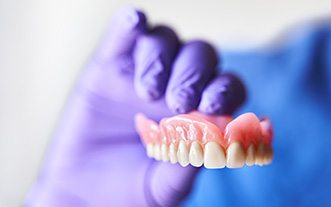
Most patients who are without multiple teeth or who are missing an entire row are likely candidates for dentures. However, before any kind of treatment can be provided, a thorough examination must first occur. This allows our team to identify if any existing oral health issues might keep your new teeth from being successful.
For instance, you need healthy gum tissue to support your full or partial dentures. If you suffer from gum disease, we will need to provide appropriate treatment to set your smile up for greater success. Also, if your jawbone lacks the necessary density, it will not adequately support your new prosthetics. In this case, you would need a bone graft.
Alternative Tooth-Replacement Options
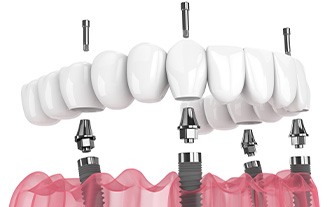
If our team believes you might be better suited for an alternative tooth replacement solution, we offer two for you to consider:
- Dental Bridge: A fixed dental bridge replaces multiple missing teeth and successfully remains in place for up to 10 years with the right amount of proper care. It consists of two dental crowns and artificial teeth that come together to create the bridge. It attaches to anchoring abutment teeth on either side of the gap so that it fills in the gap in the most natural way.
- Dental Implants: Dental implants can be used to secure an implant bridge or implant denture in place, depending on how many teeth are missing. We can use two implant posts to support a bridge or between 4 and 6 posts to hold an implant denture firmly in place. No matter which one you need, you can expect your results to last decades or even a lifetime.
Types of Dentures
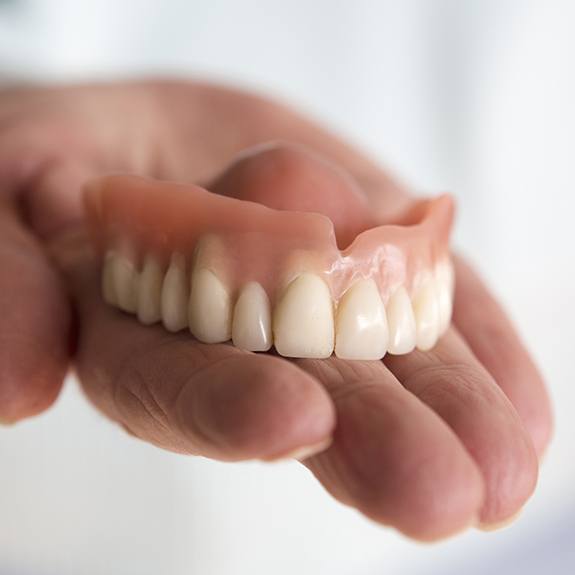
Dentures have been used for hundreds of years to replace teeth. Thankfully, modern dentures have come a long way since prosthetics were made from wood and animal bones. Dentures today are composed of an acrylic, gum-colored base attached to artificial teeth. Some dentures are removable, while others are fixed and can only be taken out by your dentist in Glastonbury. There are three different types of dentures that we offer, and the prosthetic that we recommend for your smile will depend on the condition of your oral health as well as your specific needs.
Partial Dentures
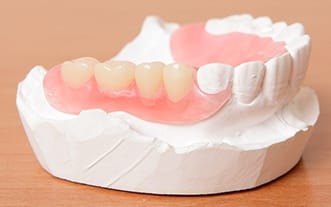
Partial dentures are the best denture solution for those who still have some of their natural teeth. Depending on the number of teeth that you’re missing and where you’re missing them, we can use a partial denture that is held in place with clasps or dental implants. This denture fills the gaps in your smile like putting together the missing pieces to a puzzle, which allows you to keep your remaining natural teeth intact. Partial dentures can come in fixed or removable options, but we will recommend the solution that works best for you after examining your mouth.
Full Dentures
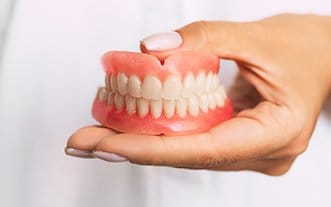
Full dentures are still the fastest way to receive a complete smile replacement. Our dentures in Glastonbury are custom-made to give you a smile that you’ll be proud to show off. The light and flexible gum-colored base is attached to artificial teeth, and it’s designed to rest on top of your gums, staying in place with natural suction. You can also use mild denture adhesive to secure your full denture for day-to-day use. During the night, you can take them out to give your gum tissue a rest and soak them in a cleaning solution to keep your mouth healthy.
Implant Dentures
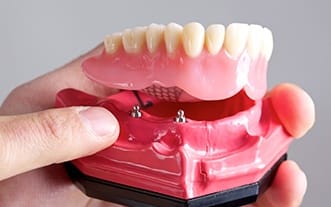
If you want the strongest, most natural looking and feeling denture, this option is for you. An implant denture combines the benefits of dentures and implants to give you a sturdy and beautiful full smile replacement. Dental implants are small titanium posts that are placed in your jawbone to act as artificial tooth roots. Once these are placed, they can be used to support your denture. The result is a strong smile that allows you to chew through all of your favorite foods. Plus, dental implants stimulate your jaw to prevent it from deteriorating after tooth loss.
Benefits of Dentures

The various benefits of dentures improve the quality of life of many patients in Glastonbury. A full, complete smile makes it easier to enjoy simple pleasures like talking and eating and can give you the confidence boost you’ve been looking for. If you decide to combine your restoration with dental implants, then you’ll experience even more comfort and security! Here are a few specific examples of what a quality set of dentures can do for you.
Psychological Benefits

Studies show that the consequences of severe tooth loss can contribute to feelings of anxiety and depression – but you probably don’t need science to tell you that dental gaps can take a toll on your mental health. Once they’re filled with quality dentures, you’ll be able to smile effortlessly, and without worrying about revealing empty sockets.
Clearer Enunciation

In English, several sounds (like “th,” “s,” and “z”) are created by pressing the tongue against the back of the teeth. Because of this, dental gaps can make it difficult to enunciate clearly. With dentures, it’ll be much easier to talk smoothly.
Improves Nutrition

Missing teeth can also create challenges for proper chewing. Breaking your food down doesn’t just enable you to swallow it – the process mixes saliva into each bite, coating the food in a special enzyme that helps the digestive system absorb the nutrients inside. By empowering your chewing ability, dentures can improve your nutrition. That, and the fact that they will allow you to eat a wider variety of foods!
Preserves Oral Health
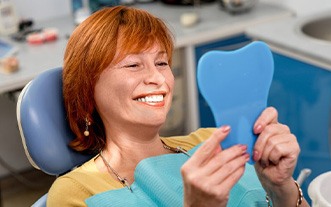
Natural teeth have a tendency to try and compensate for dental gaps by shifting their positions. This is known as “dental drift,” and it can create excess strain on your teeth or negatively impact your bite. Over time, this can lead to enamel damage, jaw pain, and other oral health problems. Filling dental gaps with dentures effectively prevents dental drift and preserves your oral health in the process.
Expands Opportunity

There’s something about a bright, seamless smile that people find irresistible. According to researchers, those with a complete set of teeth are more likely to make stand-out first impressions, receive job offers and promotions, and enjoy more social benefits overall. In that sense, dentures can expand many opportunities for you!
Understanding the Cost of Dentures

Dentures are an excellent way to revitalize your smile after tooth loss, but they’re also an investment in your oral health and quality of life. However, it’s not always an easy decision as many patients have concerns about their finances. At our Glastonbury practice, we want our patients to truly understand the costs involved so they make an informed decision about their dental care. So, read more below to explore the financial details of dentures and when you’re ready, give us a call to schedule a consultation.
Factors that Affect the Cost of Dentures

Several factors can affect the cost of your dentures. This is why a thorough consultation is always the first step. We’ll evaluate your oral health, take X-rays, and discuss your options. Here are some of the ways the cost of your dentures can fluctuate:
- Preparatory Treatments: Preparatory work, like tooth extractions or gum disease treatment, can add to the overall expense.
- Denture Type: Full dentures that cover your entire arch generally cost more than partial appliances that fill smaller gaps.
- Materials: Quality materials are more expensive, but they’re well worth the investment. The acrylic base and the porcelain teeth that are molded to them can both be customized and carry their own costs.
While it might be tempting to settle for cheaper dentures, it's important to remember that lower costs often mean lower quality. The cheaper the appliance, the less comfortable it will be and the lower its longevity on average.
Are Implant Dentures More Expensive?

Implant dentures generally come with a higher price tag than traditional dentures, but the benefits can more than justify the investment! Implanted dentures are anchored to dental implants that are placed in your jawbone, offering superior stability, a more natural appearance, and the ability to eat a wider variety of foods without worry.
Unlike traditional dentures, implant dentures don’t slip out of place and can last much longer with proper care. They’re also the only tooth replacement option that can preserve your jawbone, preventing it from deteriorating over time. This saves you time and money by reducing the need for frequent replacements and adjustments.
Does Dental Insurance Cover Dentures?

Dentures are typically classified as a major procedure under most dental insurance plans, which means they are likely to be covered at around 50% of the total cost. However, coverage can vary, so it's important to check with your insurance provider to understand your specific benefits. If you need help, our team is highly knowledgeable and more than happy to assist you with navigating your insurance before beginning treatment.
Other Options for Making Dentures Affordable

We know that many patients either can’t afford dental insurance or don’t receive it from their workplace. That’s why our team offers CareCredit! This financing option allows you to get the treatment you need now and split the cost into more manageable monthly payments. If you’re concerned about the cost of dentures, we encourage you to schedule a consultation with us to explore all your available options. Together we can find a smile solution that fits your budget!
Dentures FAQs
Before you get dentures in Glastonbury, you might have some concerns about them. That makes total sense! After all, you likely want to ensure they’d be effective. We here at Heim & Carroll DMD, LLC understand and are eager to help. Therefore, listed below are answers to questions we often get about dentures to give you a better idea of what to expect from treatment.
If your specific denture question isn’t mentioned, don’t worry. Instead, feel free to reach out and speak directly with us at our office! We’d be happy to explain more about the procedure.
What is the Average Age for Dentures?
While tooth loss can happen at any age, it’s far more common among older patients. Roughly 66% of adults aged 40-64 are missing at least one tooth. Meanwhile, only 33% of those 20-39 years old have lost a pearly white. The former percentage, furthermore, only rises as you pass middle age and enter your later years.
Given these facts, most denture-wearers are seniors. An American Dental Association census even found that 57% of people ages 65 to 74 wear a denture. Still, all ages can potentially qualify for treatment.
Should I Have All My Teeth Pulled to Get Dentures?
In most cases, repairing a damaged tooth is better than getting a replacement.
You see, extraction treatments are often invasive. As such, they’re only recommended for difficult situations — extreme tooth decay, infection, massive loss of enamel, etc. Dentists will always consider alternatives before suggesting a tooth extraction.
Is It Hard to Talk with Dentures?
Learning to speak with dentures takes time when you first get them. That’s just inevitable, as you’ll have only spoken with your natural teeth before now.
As for how long you’ll need to get used to speaking with dentures, the timing varies from person to person. Often enough, frequent practice leads to faster adjustments. To speed up the process, you could try reading out loud to yourself and repeating difficult-to-pronounce words. Speak slowly at first, as fast speech can come out muffled.
Can I Use Regular Toothpaste to Clean My Dentures?
Dentures do need daily cleaning, but you shouldn’t use regular toothpaste on them. It can be abrasive and leave tiny scratches on your false teeth. With time, these marks can leave your prosthetics seriously damaged.
For the same reason, you should also avoid using hard-bristled toothbrushes. Instead, use a soft-bristled one.
The proper cleaning solutions for dentures are hand soap, mild dishwashing liquid, and specialized denture cleaners. Remember to use such products on your appliance after every meal.






